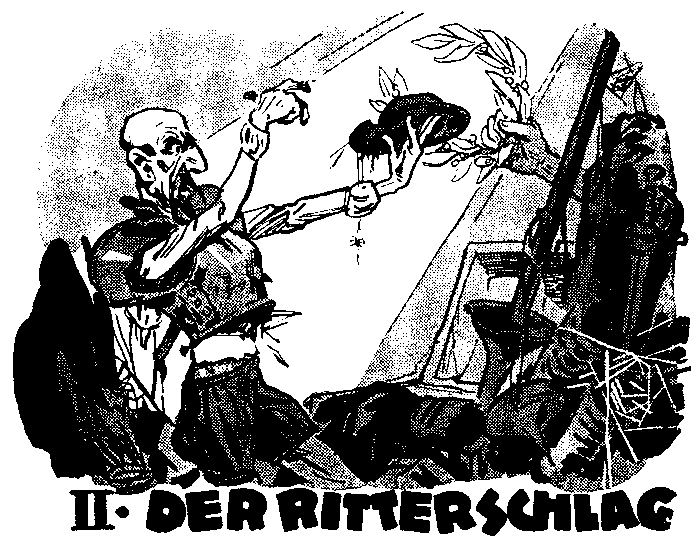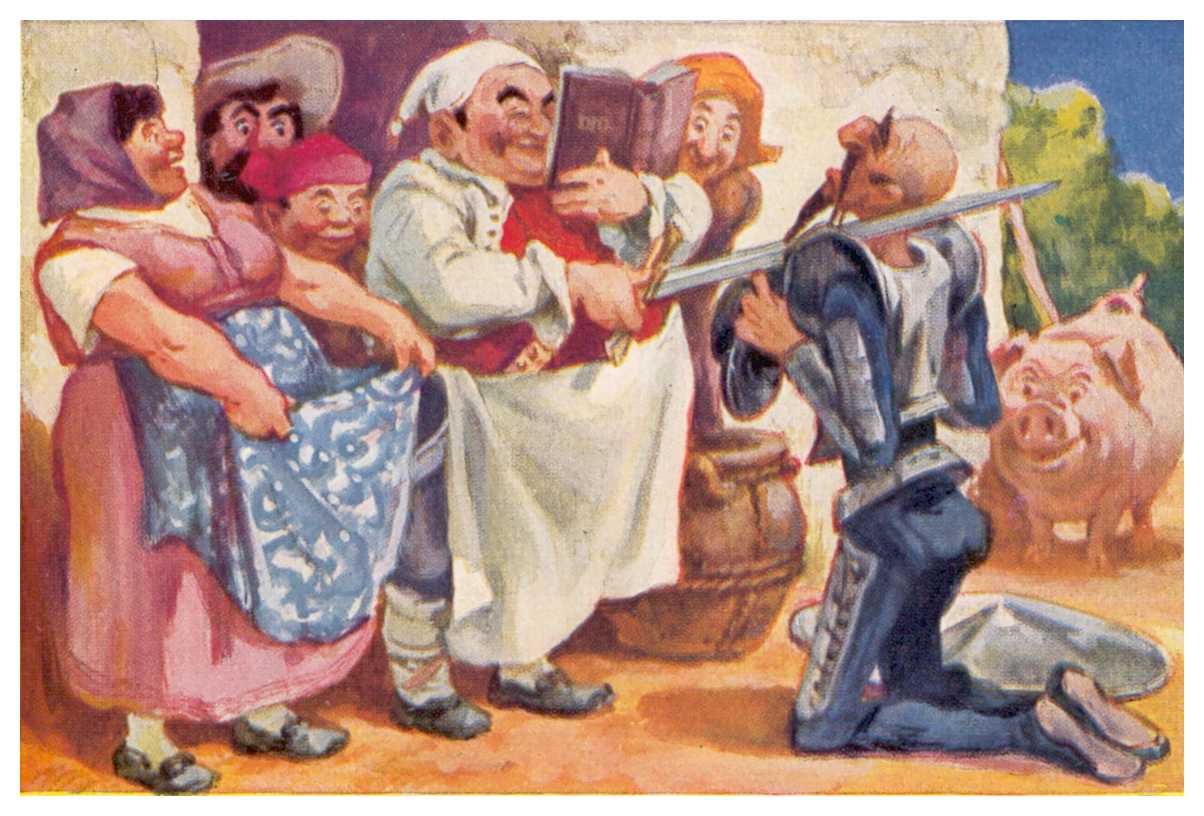
The first thing he did was to clean and polish some armour which had belonged to his ancestors and had lain around in the attic covered in dust and eaten with rust.
While he was doing this, he noticed with shock that the most important part was missing - the helmet. He searched every nook and cranny and finally discovered an old leather headpiece which must have belonged to an ordinary soldier. With great labour he fashioned out of this object a dignified looking helmet, half of which was now made of pasteboard. He wept tears of exasperation when he saw that one stroke of his sword sufficed to demolish the fruit of his labours. After much racking of brains he reinforced the pasteboard with wire and bits of iron and declared the reconstructed headpiece to be the most solid and perfect helmet in the world.
He then donned the armour and began the search for a pleasing name for his thin nag, which had more ailments than there are pence in a guinea. He browsed in his heroic tales and found the delightful name Rocinante for his future warhorse. As a gallant and courageous knight, he called himself Don Quixote of la Mancha. Having resolved this major difficulty, he said to himself: "A knight errant is nothing without chivalrous love. I must find a lady to rule my heart and soul and whose cause I can serve. In a hamlet near his village there was a red-cheeked farmer's daughter to whom he had taken a fancy quite some time previously. He decided she was the right person to be declared the queen of his heart, and he called her Dulcinea of Toboso. -
So he resolved to waste no more time but to put his bold and splendid plan into practice. Don
Quixote of la Mancha armed himself with his shield, sword and lance, mounted Rocinante and rode out into the plain through the back gate of his chicken yard. Then it occurred to him that he needed a shield bearer, and as he happened to be approaching a neighbour, an honest peasant of somewhat deficient intelligence, he endeavoured to win him for his grand design.
 Sancho Panza was this stout little peasant's name. At first he showed no interest in chivalry and knight errantry. But Don Quixote made all sorts of promises and assured him that he would sooner or later conquer a kingdom or an island which
Sancho Panza would rule as king or viceroy. The good peasant was tempted and, despite wife and children, he finally decided to serve the noble knight.
Sancho Panza mounted his donkey, which in addition to him had to carry a heavy knapsack, and he departed secretly with his future lord and master without bidding farewell to his family. When they came to the first inn, Don Quixote said to his shield bearer:
"An acquaintance of mine lives here, a nobleman in reduced circumstances who is forced to ply the vulgar trade of innkeeping. I shall ask him to come out and dub me a knight under God's own skies. The innkeeper, the son of a farm labourer, considered this desire highly original and was prepared to comply. He fetched two servant girls who were minding the geese and a scullery boy to act as witnesses so that the ceremony was suitably dignified. Then he had the mad knight kneel down, borrowed his sword and gave him a number of such heavy blows on the shoulder with the flat of the blade that anybody else other than steadfast Don
Quixote would have protested loudly over such a conferring.
Sancho Panza was this stout little peasant's name. At first he showed no interest in chivalry and knight errantry. But Don Quixote made all sorts of promises and assured him that he would sooner or later conquer a kingdom or an island which
Sancho Panza would rule as king or viceroy. The good peasant was tempted and, despite wife and children, he finally decided to serve the noble knight.
Sancho Panza mounted his donkey, which in addition to him had to carry a heavy knapsack, and he departed secretly with his future lord and master without bidding farewell to his family. When they came to the first inn, Don Quixote said to his shield bearer:
"An acquaintance of mine lives here, a nobleman in reduced circumstances who is forced to ply the vulgar trade of innkeeping. I shall ask him to come out and dub me a knight under God's own skies. The innkeeper, the son of a farm labourer, considered this desire highly original and was prepared to comply. He fetched two servant girls who were minding the geese and a scullery boy to act as witnesses so that the ceremony was suitably dignified. Then he had the mad knight kneel down, borrowed his sword and gave him a number of such heavy blows on the shoulder with the flat of the blade that anybody else other than steadfast Don
Quixote would have protested loudly over such a conferring.